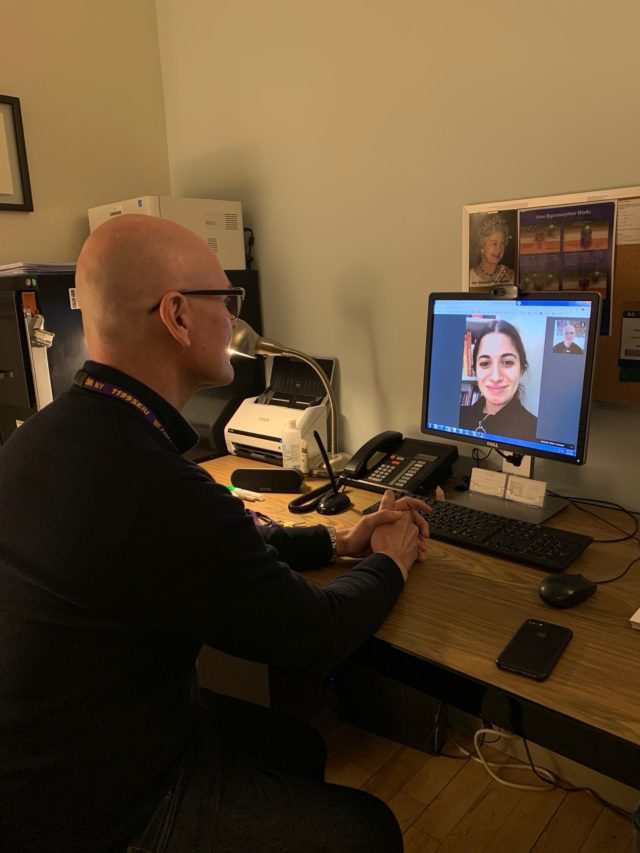How to Manage Your Anxiety During the COVID-19 Pandemic

Staff at the Methadone Maintenance Treatment Program using Telehealth video counseling
“It’s important to understand that you cannot control anxiety from occurring – this is your brain’s automatic survival mechanism,” says Gail Reid, Director of Behavioral Health Services at Greenwich House. “What matters is learning how to respond to anxiety helpfully, so that you don’t get carried away by it.” Below are some tips to help manage anxiety related to the coronavirus pandemic.
1. Breathe…The Right Way
Sometimes anxiety can affect your body where you may experience feeling shortness of breath, chest tightness, or increased heart rate or palpitations. These feelings may be due to shallow breathing or over-breathing. Take a moment to test your breathing by placing one hand on your chest and the other on your stomach. Breath for a few seconds and notice which hand rises. If it’s your chest, you might have developed a habit of shallow breathing (breathing in too quickly).
Here is a quick belly-breathing practice that you can do for 5-10 minutes a day to promote calmness:
● Inhale gently, lightly and slowly count to four, expanding your belly as you do so
● Hold that breath for a count of two
● Slowly exhale through your mouth for a count of six
2. Focus on What’s in Your Control
“Anxious thoughts typically focus on worst case scenarios and ‘what if’ questions,” says Gail. “It may not feel like we have much control over our lives right now so it is best to focus on what we do have control over.” Here are some examples you can focus on:
● Following the latest directives from the government
● Creating a daily routine
● Reaching out to loved ones
● Exercise and diet
3. Practice Gratitude
There are a lot of big changes happening in the world and your personal life right now that might all seem negative. Practicing gratitude by making note of small positive parts of your life has been shown to reduce stress and anxiety, boost mood, strengthen the immune system and improve sleep. Try incorporating this into your daily routine by picking a time of day to write down a couple things you are grateful for. If you have been feeling particularly low you may be pleasantly surprised at how much there is to be grateful for each day whether it’s sunny weather or a new episode of your favorite TV show.
4. Manage Your News Intake
It can be easy to get sucked into the 24 hour news cycle in a time like this when all aspects of life are changing rapidly and you want to stay informed. The news that makes headlines, however, is often the most extreme and tends not to offer information that will help guide us through social distancing or managing our physical or mental health. To help reduce feelings of anxiety over the pandemic and other problems of the world, try to limit looking at the news to once per day. This may also mean limiting how much time you spend on social media sites like Facebook and Twitter where you don’t have control over the content you see as you scroll.
If you’re finding that your anxious feelings are overwhelming, preventing you from carrying on with your day-to-day life, or are leading you to unhealthy coping mechanisms like drugs or alcohol, speak with a counselor or therapist with a Telehealth session. Greenwich House continues to accept new clients who are in need of counseling for overcoming substance misuse, children and their families who have experienced trauma or abuse, and seniors struggling with depression and other mental health issues. Follow the links for each program to get started.
If you need to speak with a counselor immediately, NYC Well offers 24/7 confidential and free counseling services via text and phone calls. You can learn more at https://nycwell.cityofnewyork.us/en/.

